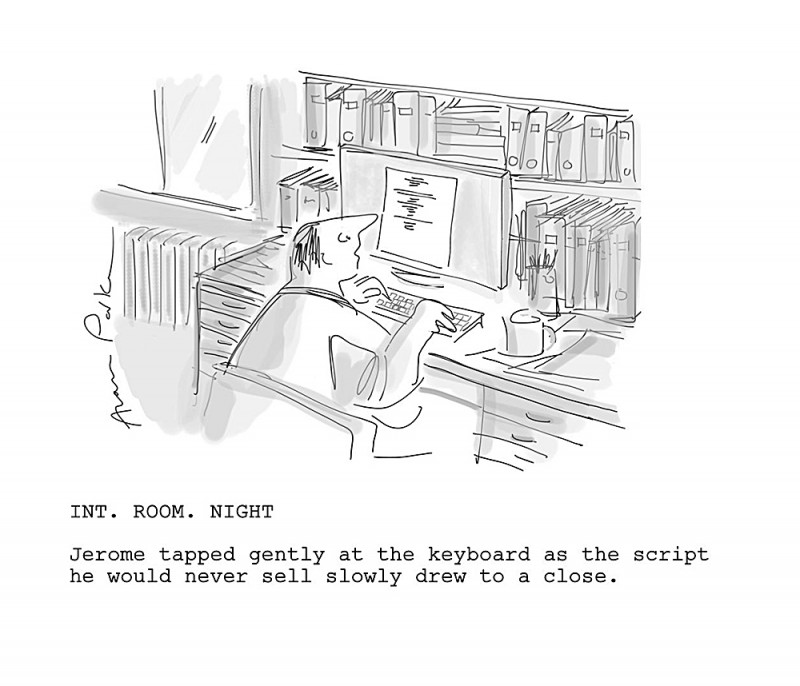On Writing
A sensational ending helps. As does a terrific start — and, of course, a juicy second act. But not necessarily in that order.
In Dr Zhivago, in the middle of the third act, Omar Sharif starts writing the ‘Lara’ poems. That should be screenplay suicide. Except it weirdly works. Poems? In the middle of the third act? In long hand?
The first script I wrote that got made (Melody) had a quite lazy, laborious opening. But twenty minutes in, the little girl in the story buys a goldfish and from then on it’s OK. So it’s always good if you can get to the ‘goldfish’ on page one.

A script takes about a year of your life on average: two months to write it and ten months to re-write it.
There’s not a screenplay written that couldn’t stand a rewrite”
Or better put: “The first draft of anything is always shit.” Ernest Hemmingway.
‘The script is everything’ is the truism. Well, everything but a movie. It’s a blueprint for a movie — it doesn’t exist as an entity unto itself: it’s just a route-map to somewhere else.
I’m a writer and a director. Believe me, directing is harder. There’s more people to negotiate, the hours are obscene, the lunches lousy and mostly you wake up each morning wondering where the hell you are.
I’ve written a number of scripts that didn’t get made. Actually, they did get made, but in my head. I could have a whole film festival in my head.
Writing a screenplay is like making the movie, only without the camera.
Writing an unmade screenplay can sometimes be a bit like sucking a polo mint. It can be very pleasurable while you’re doing it, but in the end you get left with nothing but the hole in the middle.
Pitching any film idea to a studio executive is a bit like juggling in boxing gloves, whilst tap dancing in treacle, for an audience that appears to have gone to the bathroom.
Most people pitch their scripts as a “cross between”. “It’s a cross between Battle of Algiers and The Godfather” is always a good one. “A cross between Reds and Blue Lagoon” is not so good.
Credit grabbing is a Hollywood disease. If someone steals your credit cards they go to jail. In Hollywood they go to arbitration.
It’s very painful to shoot an over-length script. It’s so much easier to tear the pages out before you begin filming rather than going through the agony of shooting stuff and then throwing it away. It’s a lesson I’ve never learned.
If you want to ensnare a movie star it helps to begin a script with the male lead description as, “We see JIM, 30-ish, handsome in a special, unfussy way: his simple persona disguises a fierce intelligence.” It also helps if you call the character Tom, Matt, Ben or Brad.
Crucially, an American screenplay always asks the question, “What happens next”. This is superfluous in a European script because invariably nothing happens anyway.
As writing tools go, “Final Draft” is right up there, alongside Blackwing pencils, 3 x 5 cards and Santa Margarita Pinot Grigio.”
Or “A long haul train with a drinks trolley and dining car is as close as I get to an ideal writing space.” Mohammed Hanif
The most important words when writing a script are “Save” and “Back-up.”
Writing a novel is a liberating experience—you do it on your own and you don’t have the budgetary constraints that you have when writing and making a film. My novel, ‘The Sucker’s Kiss’, starts with a recounting of the 1906 San Francisco earthquake and then covers twenty different American states during a thirty-year time span. I’d hate to think of the cost of that as a movie.
My wife says that I have been mostly influenced by books I pretended to have read and movies I never saw.
Half way through a film you want to strangle the writer. Even if you are the writer.
I never got on great working with other writers, but I loved working with Bo Goldman. Both married, with ten kids between us, we poured our hearts out to one another like a couple of shrinks lying on couches at opposite ends of the room.
Hollywood storeroom shelves are piled high with musty screenplays that have slipped through a not-too-discerning, fickle system. Among them are scripts which are wonderful, exciting, groundbreaking, heart-wrenching and, as they gather dust, utterly worthless.
Or: “Your script ain’t worth the buffalo shit on a nickel.” Lester Siegel, Argo.